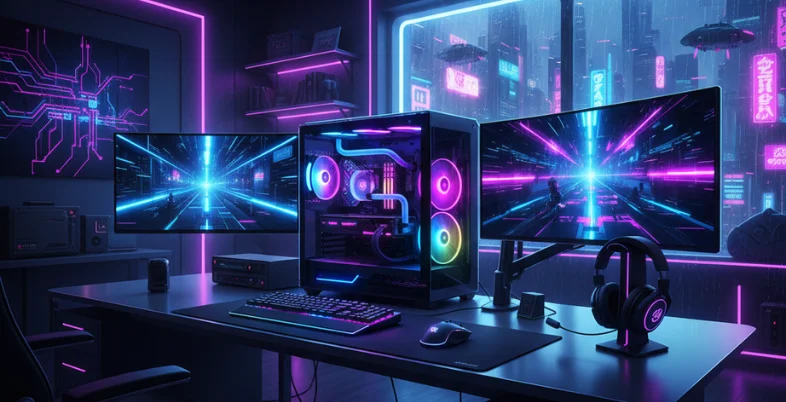Gaming has become one of the fastest-growing industries in the world, and with it, the demand for high-performance gaming PCs continues to rise. Whether you’re a casual gamer who enjoys a few hours of play each week or a dedicated enthusiast who wants to experience the latest titles at maximum settings, a gaming PC is the ultimate tool to take your experience to the next level.
Unlike consoles, a gaming PC offers flexibility, power, and customization that can be tailored to your exact needs. In this article, we’ll explore what makes a gaming PC different, what components matter most, and how you can build or buy the perfect system for your budget.
Why Choose a Gaming PC?
A gaming PC is not just another computer. It is specifically designed to handle resource-intensive games that require fast processors, powerful graphics cards, and efficient cooling. Unlike standard office computers or laptops, gaming PCs are built with performance in mind. They allow players to enjoy stunning visuals, faster load times, and smooth gameplay. On top of that, gaming PCs also double as powerful workstations for tasks such as video editing, 3D rendering, and streaming.
Another major advantage of a gaming PC is upgradability. Unlike consoles that become outdated after a few years, a PC allows you to swap out individual parts like the graphics card or RAM to keep up with new technology. This flexibility means your investment can last for years with proper maintenance and upgrades.
Key Components of a Gaming PC
To understand what makes a gaming PC powerful, it’s important to know about its core components. Each part plays a unique role in delivering performance:
- Processor (CPU): The CPU acts as the brain of your computer. A strong CPU ensures smooth performance in both gaming and multitasking. Popular options include AMD’s Ryzen series and Intel’s Core i5, i7, or i9 processors.
- Graphics Card (GPU): The GPU is the heart of gaming performance. It handles all the visuals, from character textures to environments and lighting effects. NVIDIA and AMD dominate this market, with the GeForce RTX and Radeon RX series being top choices for gamers.
- RAM (Memory): Gaming requires fast memory to handle large amounts of data quickly. At least 16GB of RAM is recommended for modern gaming, though heavy multitaskers or streamers may prefer 32GB.
- Storage: Solid State Drives (SSDs) provide faster load times compared to traditional hard drives. Many gamers use a combination: an SSD for the operating system and frequently played games, and a larger HDD for extra storage.
- Motherboard: The motherboard connects all components together. A high-quality motherboard ensures compatibility and stability while offering room for future upgrades.
- Power Supply (PSU): A reliable power supply is crucial for delivering consistent energy to your components. It’s always recommended to buy a PSU with more wattage than your system requires, providing headroom for upgrades.
- Cooling System: Gaming PCs generate a lot of heat, so efficient cooling is essential. Options include air coolers, liquid coolers, and optimized case airflow systems.
- Case: Beyond aesthetics, a case provides protection, airflow, and space for your hardware. Some gamers prefer flashy RGB cases, while others go for minimalist designs.
Building vs. Buying a Gaming PC
One of the first decisions you’ll face is whether to build your own gaming PC or buy a pre-built system.
- Building Your Own PC: Building allows you to choose every component, giving you full control over quality and budget. It is often more cost-effective and provides a sense of accomplishment. However, it requires research, patience, and some technical knowledge.
- Buying a Pre-Built PC: Pre-built gaming PCs save time and come with warranties. They are ideal for beginners or those who don’t want to deal with the technical side of assembly. The downside is that they may be slightly more expensive and sometimes include lower-quality parts in hidden areas like the power supply.
To be, or not to be, that is the question. It is not in the stars to hold our destiny but in ourselves. You must be the change you wish to see in the world.
Gaming PC Accessories
A powerful gaming PC isn’t complete without the right accessories. Key peripherals include:
- Monitor: A high-refresh-rate monitor (144Hz or higher) provides smoother visuals. Resolution options range from 1080p to 4K depending on your GPU’s capability.
- Keyboard and Mouse: Mechanical keyboards and high-DPI gaming mice are popular for faster response times.
- Headset: Quality headsets provide immersive sound and clear communication during multiplayer games.
- Controller: For some genres, like racing or sports games, a controller may enhance the experience.
Budget Considerations
Not everyone has thousands of dollars to spend on a gaming PC. Fortunately, there are options for every budget:
- Entry-Level Gaming PCs: Cost between $600 and $900, suitable for 1080p gaming on medium settings.
- Mid-Range PCs: Around $1,000 to $1,500, these systems can handle 1440p gaming at high settings.
- High-End PCs: $2,000 and above, offering 4K gaming, VR support, and future-proofing for years to come.
The key is to balance your budget with your gaming goals. Spending wisely on the GPU and CPU usually provides the best return in performance.
The Future of Gaming PCs
The future of gaming PCs looks promising, with technologies like ray tracing, AI-powered graphics, and cloud integration shaping the industry. Developers are creating more immersive and demanding games, which means PCs will continue to evolve with even more powerful components. Innovations in cooling systems, compact designs, and eco-friendly power supplies are also making gaming PCs smarter and more efficient.
Final Thoughts
A gaming PC is more than just a machine—it’s an investment in entertainment, creativity, and performance. Whether you decide to build your own or purchase a pre-built system, the key is to understand what components matter most and how they fit your needs. From breathtaking visuals to seamless multitasking, the right gaming PC can transform the way you experience digital worlds.
If you’re ready to take your gaming to the next level, a carefully chosen gaming PC could be the perfect gateway to endless adventures.

